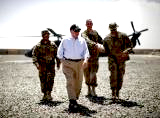 Washington, Jan 10: The US Navy SEALs were prepared to do "whatever was necessary" to escape if Pakistani forces surrounded and confronted them during the covert raid to kill al-Qaeda chief Osama bin Laden in Abbottabad, former Defence Secretary Robert Gates says in his new book.
Washington, Jan 10: The US Navy SEALs were prepared to do "whatever was necessary" to escape if Pakistani forces surrounded and confronted them during the covert raid to kill al-Qaeda chief Osama bin Laden in Abbottabad, former Defence Secretary Robert Gates says in his new book.
"I worried that Pakistani Inter-Services Intelligence was aware of where bin Laden was and that there might be rings of security around the compound that we knew nothing about or, at minimum, that 1ST might have more eyes on the compound than we could know," Gates writes in his forthcoming book titled 'Duty: Memoirs of a Secretary at War'.
The worst-case scenario was that the Pakistanis could get a number of troops to the compound quickly, prevent extraction of our team and take them prisoner, he writes.
When he asked his Vice Admiral William McRaven what he planned to do if the Pakistani military showed up during the operation, he said the team would just hunker down and wait for a "diplomatic extraction."
"They would wait inside the compound and not shoot any Pakistanis. I then asked what they would do if the Pakistanis breached the walls: 'Do you shoot or surrender?' Our team couldn't surrender, I said. If the Pakistani military showed up, our team needed to be prepared to do whatever was necessary to escape," Gates writes.
"After considerable discussion, there was broad agreement to this, and as a result, additional MH-47 helicopters and forces were assigned to the mission," he says.
Gates writes that ahead of the Abbottabad raid no one inside the administration talked about seeking Pakistani help in killing Osama bin Laden.
"No one thought we should ask the Pakistanis for help or permission. In every instance when we had provided a heads-up to the Pakistan military or intelligence services, the target was forewarned and fled, or the Pakistanis went after the target unilaterally, prematurely and unsuccessfully," he says.
The successful bin Laden raid, he writes, was humiliating for the Pakistan Army.
"Probably the biggest impact was the humiliation of the Pakistani military. The one respected institution in the country was considered by many Pakistanis to have been either complicit in the raid or incompetent," he writes.
Bin Laden was killed in a covert US raid in May in 2011 in Pakistan's garrison city Abbottabad.





Comments
Add new comment